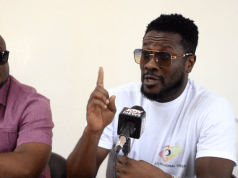President Nana Addo Dankwa Akufo-Addo has completed and commissioned the second phase of the University of Ghana Medical Centre Limited (UGMC), making the state-of-the-art health facility a holistic service provision centre.
The project, which commenced in 2019, was made possible through a $217 million facility secured from the Bank of Hapoalim in Israel.
The grant of the facility signified the strong and productive relations existing between Ghana and Israel.
President Akufo-Addo said his Administration was committed to providing Ghanaians and residents with befitting health infrastructure and world-class healthcare in the country.
The phase two scales up the status of the centre to a quaternary care institution, as it will now provide highly specialised, experimental, and uncommon diagnostics and surgical procedures.
The facility now has 42 specialist and subspecialist clinics, a cardiothoracic surgery centre and a cardiac catheterisation laboratory.
It also includes an eight-unit apartment for critical staff, a biohazard waste treatment building, a waste dumpster shed an oncology ward, neurosurgery with neurology ward and an intensive care unit, an assisted reproductive technology center, private wards, paediatric surgery unit, and an MRI and Dental service units.
President Akufo-Addo stated that the UGMC’s mainstay was to deliver healthcare, adding that the facility played a pivotal role in managing complicated referrals from other hospitals in the country.

He said the Centre has provision for walk-in patients who seek specialist or consultant attention and will also deliver health services in the areas of trauma and orthopaedics, urology, ear nose and throat care, cardiology, and dermatology, accident and emergency services, pain management, among others.
Apart from these, the UGMC has a medical training and simulation centre, which will serve as a national facility for the training of health professionals across the country.
“It is equipped with the state-of-the-art equipment capable of simulating various disease conditions to enable our health professionals to have comprehensive hands-on experience”, President Akufo-Addo added.
Self-sustaining
According to the President, the second phase of the health facility included investment and business models to make the UGMC self-sustaining over five years.
He expressed his government’s commitment to ensuring the availability of the requisite personnel to provide services at the Centre and thanked all key stakeholders who worked to ensure the project became a success.
The Chief Executive of UGMC, Dr. Darius Kofi Osei disclose that the Centre now has three focal areas including the Medical Stimulation and Training Centre, Clinical Services Section and Scientific Research Centre.
He said with the completion of the second phase, the facility’s forefront Medical Stimulation and Training Centre is the biggest training centre in West Africa.
“This training facility is an internationally recognised multi-disciplinary academic Centre and it’s committed to achieving excellence in medical education, using high-quality and innovative computer-based stimulation.
“Our 1000-bed clinical services section of the UGMC is committed to the promotion of favourable health outcomes through innovative, customer-centred, cost-effective, and high-quality processes. We are currently running almost 40 specialty and sub-specialty level clinics from the humble beginning of running three general service OPD clinics”, Dr. Osei disclosed.
He also told the Akufo-Addo government that the Centre needed to be resourced with the requisite infrastructure to be able to deliver more sub-specialized services.
The Centre, Dr. Osei indicated, needed a helipad to assist us in the evacuation of trauma cases to boost medical tourism.
It also needs the setting up of a Radiotherapy Centre for cancer treatment, an infectious disease center, accommodation for specialists and other critical staff and official vehicles for the centre.
UGMC phase one
The construction of the 617-bed UGMC, which was initiated by late former President John Evans Atta Mills in 2011, actually commenced in April 2013, and inaugurated by former President John Dramani Mahama on January 4, 2017.
The first phase comprised eight separate buildings and houses, different specialised areas such as emergency, imaging, operating theatres, laboratories and a computer room.
It was undertaken at a cost of $271 million, coming with maternity and paediatric clinics, an orthopaedic centre, an in-patient medical training facility, staff accommodation and a maintenance and logistics building.
Other facilities in the first phase were centres for specialist care in areas, including urology, ophthalmology, ear, nose and throat, cardiology, dermatology, neurology and interventional radiology (cancers).
It also had had a medical hotel where clients could live and consult specialists








































